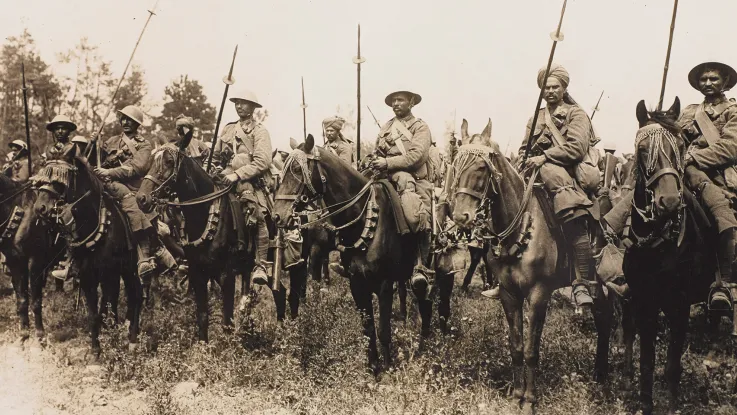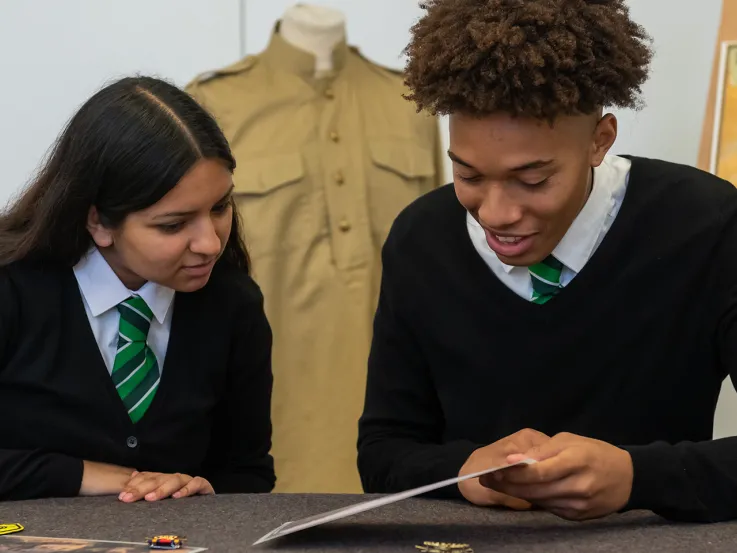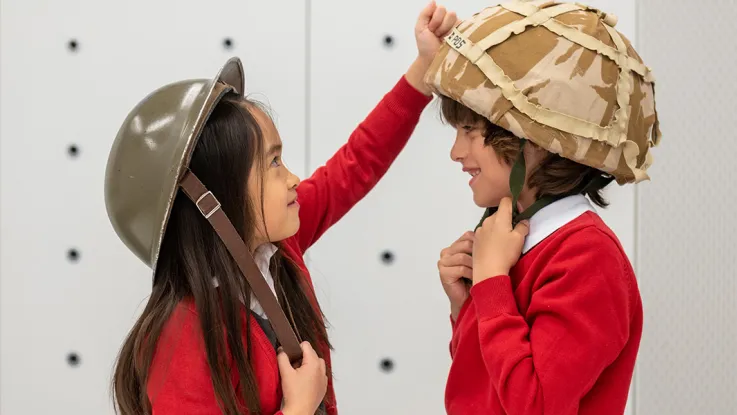CPD for History Teachers

Deepen your knowledge, enhance your teaching
How to book
Each session will run from 4.00pm to 5.00pm and feature a talk delivered live by a Museum specialist followed by a Q&A. For details of upcoming talks, please see below.
To book places, for yourself or colleagues, please complete the booking form. In advance of the booked session you will receive a Zoom meeting link and a bespoke digital resource pack to further support your teaching.
CPD sessions
Information about upcoming CPD sessions will be shared here soon.
Past sessions
The British occupation of Germany, 1945-49, and the origins of the Cold War
Speaker: Dr Daniel Cowling
Date: Wednesday, 15 January 2025, 4.00pm
Topics and themes: Cold War, Germany, Politics
In this talk, historian Dr Daniel Cowling will explore Britain’s attempt to ‘win the peace’ in the aftermath of the Second World War – and its major bearing upon the course of the early Cold War. It considers plans made for the future of Germany during the wartime peace conferences at Yalta and Potsdam, as well as the emerging uncertainties about Britain’s role in world affairs in a new era of superpowers. Showcasing his new research, Dr Cowling will go on to highlight the importance of Britain’s military occupation of Germany in shaping the ideological, financial and political controversies of the era, from denazification policies through to the Berlin Crisis and, ultimately, the division of Germany between East and West.
From bows to Bren guns
Speaker: Julian Farrance
Date: Tuesday, 10 December 2024, 4.00pm
Topics and themes: Warfare, British Civil Wars, Napoleonic Wars, Crimean War, First World War, Second World War
Embark on a rapidly paced journey through the development of the weapons placed into the hands of British soldiers from the 17th to the 20th centuries, encompassing the British Civil Wars through to the Napoleonic Wars, Victorian conflicts including the Crimean and Boer Wars, and the First and Second World Wars. In this talk, senior curator Julian Farrance marks all of the key firearms advances and their impact on the soldiers’ ability to fight, from wheellocks and matchlocks through to flintlocks and caplocks, and finally bolt-action and automatic weapons.
The Western Front in 10 battles
Speaker: Dr Glyn Prysor
Date: Thursday, 14 November 2024, 4.00pm
Topics and themes: Warfare, First World War, Western Front
From the early skirmishes at Mons, through the great attritional battles of the Somme and Passchendaele, to the Allied breakthrough at Amiens, the Western Front was the scene of some of the most significant battles ever fought in Europe. Today, we often think about mud and futility, but these years saw revolutionary developments in warfare, tactics and technology. Dr Glyn Prysor, director of Research and Programmes at the National Army Museum, tells the story by focusing on ten key battles, their impact on the outcome of the Great War, and their significance today.
Exploring the British Civil Wars through art
Speaker: Anna Lavelle
Date: Tuesday, 15 October 2024, 4.00pm
Topics and themes: British Civil Wars, Art
How can we use art to help students explore complex histories? This talk will explore the causes and events of the British Civil Wars and the establishment of the first professional ‘New Model’ army in Britain, through the art and visual culture produced both at the time, and in later centuries. Art curator Anna Lavelle will look at the role of art as propaganda for both the Royalists and Parliamentarians, the importance of mass-produced prints, Victorian artists’ revival of the subject, and more. Portraits of important figures like Oliver Cromwell and Charles I will be investigated, along with artworks of key events and battles that shaped this turning point in British history.
The Indian Army from the First World War until Independence, 1914-47
Speaker: Dr Alan Jeffreys
Date: Thursday, 19 September 2024, 4.00pm
Topics and themes: First World War, Second World War, India, Empire, Politics
In this talk, historian Dr Alan Jeffreys will demonstrate the important role of the Indian Army in both World Wars and chart its global experience through the campaigns in Europe, the Middle East, Africa and Asia. The army adapted to the different enemies and differing terrains and changed from an imperial policing force to a modern professional army that could deal with almost any tactical situation that it encountered by 1945. During the Second World War, it became a ‘learning institution’ with the largest training infrastructure of any British and Commonwealth country. The talk will also cover some political aspects such as the interwar Indianisation of the officer corps, the Indian National Army and the period after the Second World War until the independence of India and Pakistan in 1947.
Join our learning mailing list
Be the first to hear about our latest workshops, resources and study days. Simply fill out the form to receive regular updates direct to your inbox.




